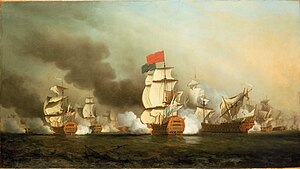First battle of Cape Finisterre (1747)
| First battle of Cape Finisterre | |||||||
|---|---|---|---|---|---|---|---|
| Part of the War of the Austrian Succession | |||||||
 Lord Anson's victory off Cape Finisterre, 3 May 1747, National Maritime Museum. |
|||||||
|
|||||||
| Belligerents | |||||||
|
|
|
||||||
| Commanders and leaders | |||||||
|
|
|
||||||
| Strength | |||||||
| 14 ships of the line 1 frigate 1 sloop 1 fireship |
4 ships of the line 8 frigates 4 corvettes 30 merchantmen |
||||||
| Casualties and losses | |||||||
| 520 killed and wounded | 4 ships of the line, 4 frigates, 4 corvettes, 6 merchantmen captured, 800 killed or wounded, 3000 captured |
||||||
The First Battle of Cape Finisterre (14 May 1747) saw 14 British ships of the line under Admiral George Anson attack a French 30-ship convoy commanded by Admiral de la Jonquière during the War of the Austrian Succession. The British captured 4 ships of the line, 2 frigates and 7 merchantmen, in a five-hour battle in the Atlantic Ocean off Cape Finisterre in northwest Spain. One French frigate, one French East India Company warship and the other merchantmen escaped.
France needed to keep shipping lanes open in order to maintain her overseas empire. To this end she assembled merchantmen into convoys protected by warships. Anson on Prince George and Rear-Admiral Sir Peter Warren on Devonshire had sailed from Plymouth on 9 April to intercept French shipping. When a large convoy was sighted Anson had made the signal to form line of battle. When Rear-Admiral Warren, suspecting the enemy to be merely manoeuvring to promote the escape of the convoy, bore down and communicated his opinion to the admiral, the latter threw out a signal for a general chase.
Centurion under a press of sail, was the first to come up with the rearmost French ship, which she attacked heavily and two other ships dropped astern to her support. The action became general when three more British ships, including Devonshire, came up. The French, though much inferior in numbers, fought till seven in the evening, when all but two of their ships were taken, as well as nine East India merchantmen. The French lost 700 men killed and wounded, and the British 520. Over £300,000 was found on board the ships of war, which were turned into British ships.
...
Wikipedia
